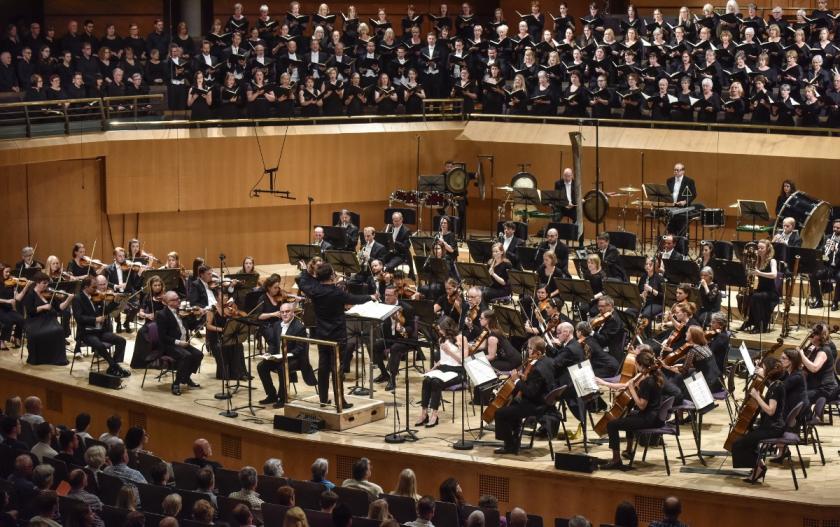Two hundred years ago next month, an assembly of around 60,000 people gathered on St Peter’s Fields in Manchester to protest about their lack of political representation. Speakers addressed the crowd, bands played and banners were carried.
The local magistrates didn’t like it and gave orders for the crowd to be dispersed by the mounted yeomanry, backed up by the hussars, who drew their sabres and charged. Eighteen people were killed and hundreds injured. That was the "Peterloo Massacre", named after the Battle of Waterloo, only four years before. The centre of its site became that of the Free Trade Hall, whose very name perpetuated an historic and allied, Manchester-inspired campaign.
Peterloo has become a potent symbol in Manchester history, and this year’s Manchester International Festival, the BBC Philharmonic and Radio 3 commissioned poet Michael Symmons Roberts and composer Emily Howard (pictured below) to commemorate it in a major new work for soloists, choirs and orchestra.
 The Anvil received its world premiere last night. It’s an ambitious 45-minute cantata, seeking not only to tell the story but also to convey a "what-would-it-have-been-like-if-you-were-there" impression.
The Anvil received its world premiere last night. It’s an ambitious 45-minute cantata, seeking not only to tell the story but also to convey a "what-would-it-have-been-like-if-you-were-there" impression.
Its construction is intricate, incorporating an idea of literally weaving words that evoke the event and its background (inspired by the fact that so many of those present or injured were described by the role of "weaver"). Michael Symmons Roberts constructed a giant grid of pregnant words that are assembled, dismantled and hurled into the mix, creating the effect of an unpredictable throng, with its slogans and would-be speakers, that must have been part of the reality of the day. As Emily Howard said afterwards: "If you were there you wouldn’t have heard anything most of the time – just snippets."
So that element in the soundworld was intentional. At the same time there is a narrative element, as Symmons Roberts’s seven-paragraph The Stones of Peterloo, picturing the scene, the event and the aftermath, is overlaid on it and interspersed with it.
This brings the more dramatic side of the story to the fore. Howard builds huge vocal-instrumental crashes, roars and surges, ratcheting up the tension as we know the fatal charge is coming, making her singers cry out their demands and the pulse of the music accelerate. There was almost an element of the Jaws film score about it – and with the greatest climax came a sound truly like that of a crowd in fear; and then there was the horrific peace that follows every bloodbath, with just the repeated intoning of the word "Suffrage", like an agonized prayer, still to be heard.
Among the most vivid elements in this soundtrack to the story was the earlier, slow tread of a procession, with hymn-like strains emerging from the choirs, culminating in a full-throated rendering of Tallis’s Canon tune – only itself to be disrupted. This has its roots in the historical evidence, too: the agitators of the day wrote polemical new words to the tunes of hymns everyone knew.
 Kate Royal (pictured right) was assigned a role that included much of the narrative part of Symmons Roberts’s poem; Christopher Purves represented the various male protagonists of the event, and more … finally including a cold, Sprechstimme-style description of the injured and their wounds.
Kate Royal (pictured right) was assigned a role that included much of the narrative part of Symmons Roberts’s poem; Christopher Purves represented the various male protagonists of the event, and more … finally including a cold, Sprechstimme-style description of the injured and their wounds.
The last word – unaccompanied soprano solo – is Symmons Roberts’s last vivid, but unsettling, summary of the heritage of Peterloo: "A piece of grit lodged in a tooth". (The title The Anvil, incidentally, simply refers to the approximate shape of the site’s ground-plan on the map).
This work’s performance was a disturbing, slightly baffling but ultimately moving experience, sometimes confusing as so much was immersed in a jumble of sounds, albeit intentionally so. It’s the kind of thing Manchester loves, as it’s art that’s special to the city and unites it in a sense of its own place in history. But it probably would be difficult to make it travel.
Ben Gernon’s sure hand on the tiller brought confident singing from the combined forces of the BBC Singers, Hallé Choir, Hallé Youth Choir and Hallé Ancoats Community Choir, and from an executant point of view all present deserve credit.














Add comment